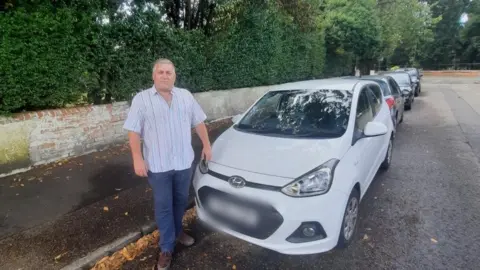A case of mistaken identity in the world of vehicle registration has left one man, Richard Lynn, fuming after receiving a hefty parking penalty due to a number plate mix-up. What makes this incident noteworthy is not merely the fine itself but the circumstances surrounding the confusion and the ensuing frustration that Mr. Lynn has experienced.
On March 18, 2024, while parked in Rushton’s Yard car park located in the town of Ashby, Leicestershire, Mr. Lynn paid £1.70 for approximately 30 minutes of parking time. His vehicle, a Hyundai, duly entered the car park as per the records. However, he later found himself the recipient of a £165 charge from Horizon Parking, the private firm in charge of the car park’s enforcement. The problem arose when photographic evidence indicated that a car with a nearly identical number plate—a Kia—had left the premises nine hours later. Mr. Lynn’s car, identified by its registration, and the Kia, differentiated by just a single letter in the plate, were mistaken for one another.
Despite Horizon Parking’s assertion that they had rectified the situation as of July 25, Mr. Lynn claims he had yet to receive any form of confirmation regarding the dismissal of the charge. His ordeal took a turn for the worse when he received a letter on March 25, 2024, demanding payment of £85, reduced to £51 if settled within 14 days. Unbeknownst to him, the situation escalated further when he found himself confronting solicitors on behalf of Horizon Parking demanding the originally stated £165 penalty months later—in July 2025.
Mr. Lynn attributes part of the communication issues to a change of address he made in December 2022, which he failed to report to the Driver and Vehicle Licensing Authority (DVLA) until early 2024. Although his address has since been updated, he believes that prior correspondence regarding the parking charge was likely sent to his old residence. Horizon Parking, for their part, assert they had sent several reminders about the situation to the address they had on file when the demand was initially issued.
As Mr. Lynn reflected on the fiasco, he expressed indignation: “It’s ridiculous. They have clearly different cars with similar but different plates but they just haven’t checked properly.” He voiced his frustration at receiving threatening letters regarding legal action over a fine that he should not have incurred in the first place. This sentiment was compounded by a belief that such errors might be widespread, leaving many individuals feeling compelled to pay unjust penalties out of fear of legal repercussions.
By July 2025, when the situation finally captured his full attention, Mr. Lynn found himself engulfed in a world of stress and anxiety, navigating bureaucracy while trying to rectify a mistake that, from his perspective, should never have escalated this far. “I almost paid them to make them go away, but I pushed back because it was a clear mistake,” he added, further articulating his anger about the lack of human oversight in the automated systems he claims led to the erroneous fines.
The case serves as a poignant reminder of the fragility of personal information in the face of automated systems. It emphasizes the importance of confirming that vehicle details are accurately recorded with governing authorities like the DVLA. Further, it invites scrutiny of private firms like Horizon Parking concerning practices that may allow for the perpetuation of errors that could lead to unfair penalties. In response to the situation, Horizon Parking claimed they endeavor to uphold proper protocol in issuing charges, encouraging motorists to promptly appeal any discrepancies when they arise.
This incident not only exemplifies how a simple number plate issue can spiral into a complicated mess but also taps into broader conversations regarding the fairness and integrity of automated enforcement systems in public and private settings.











